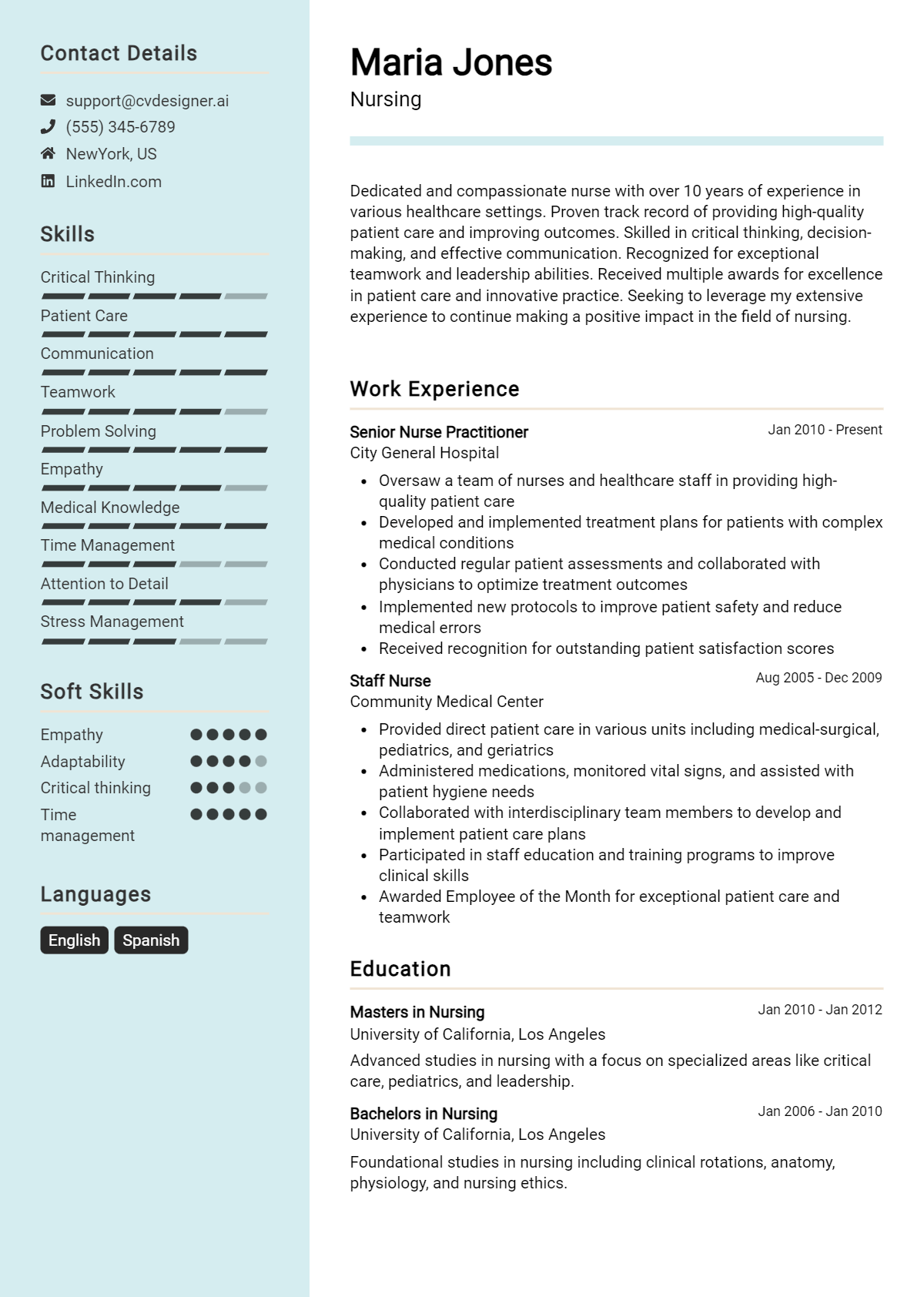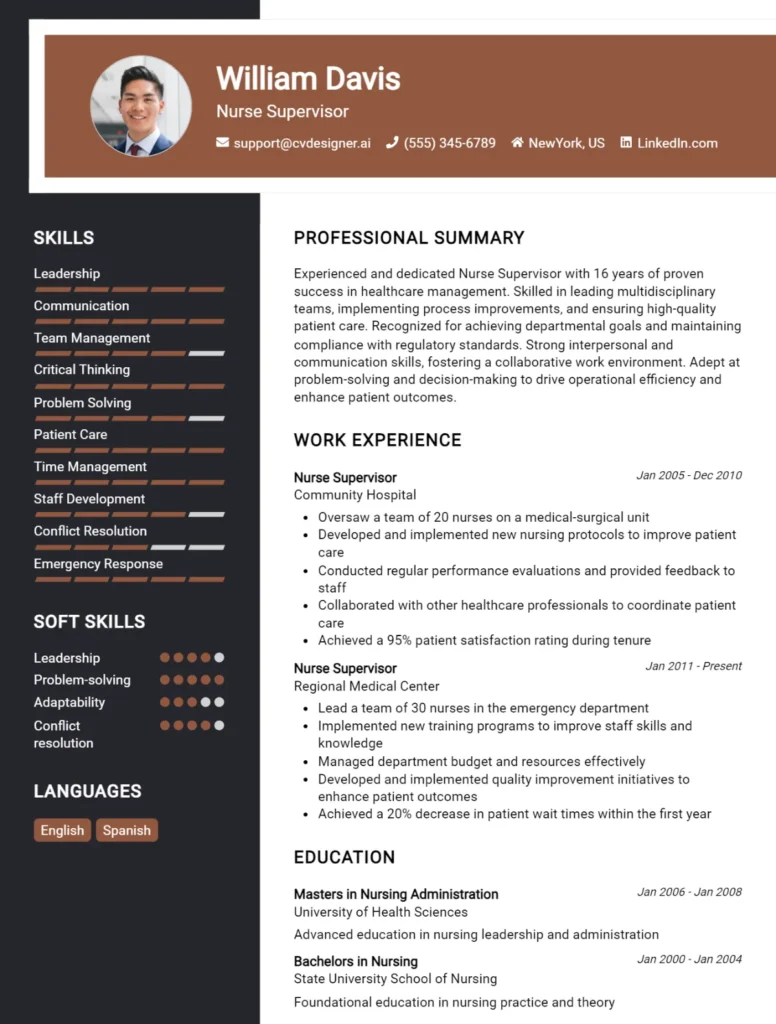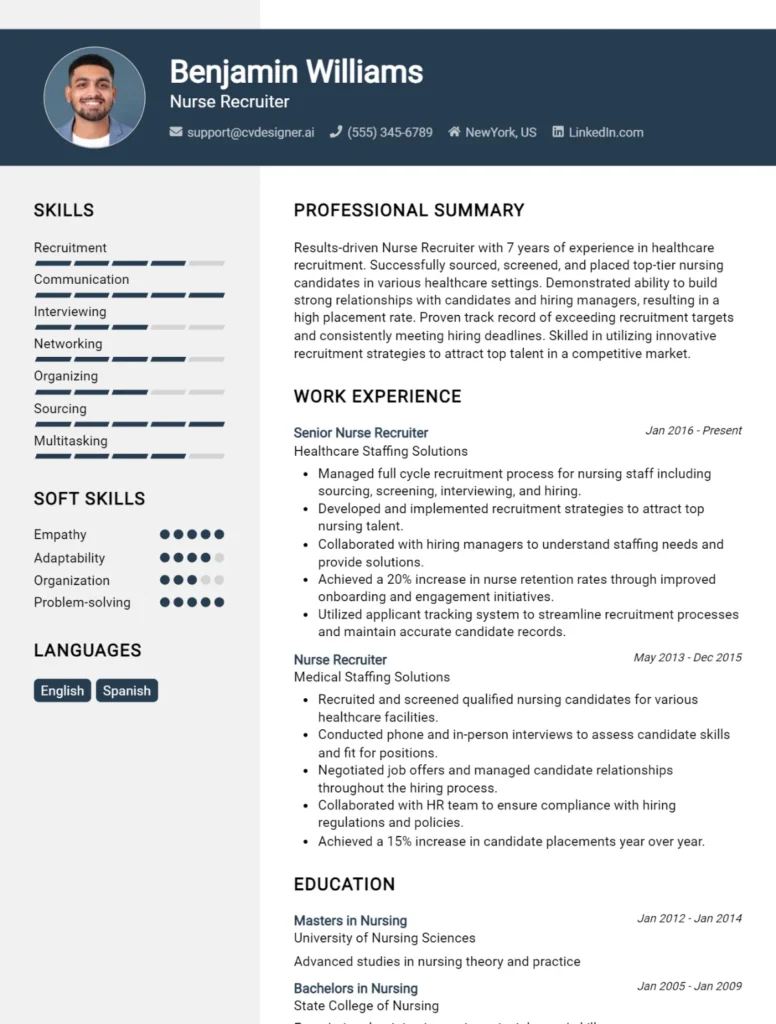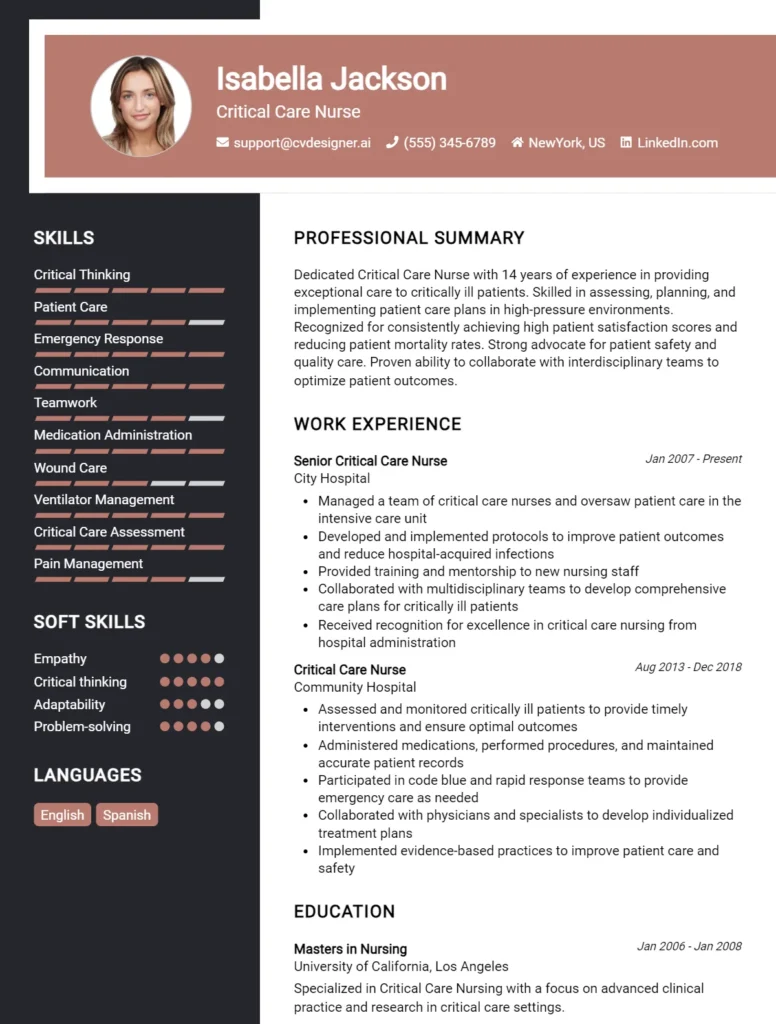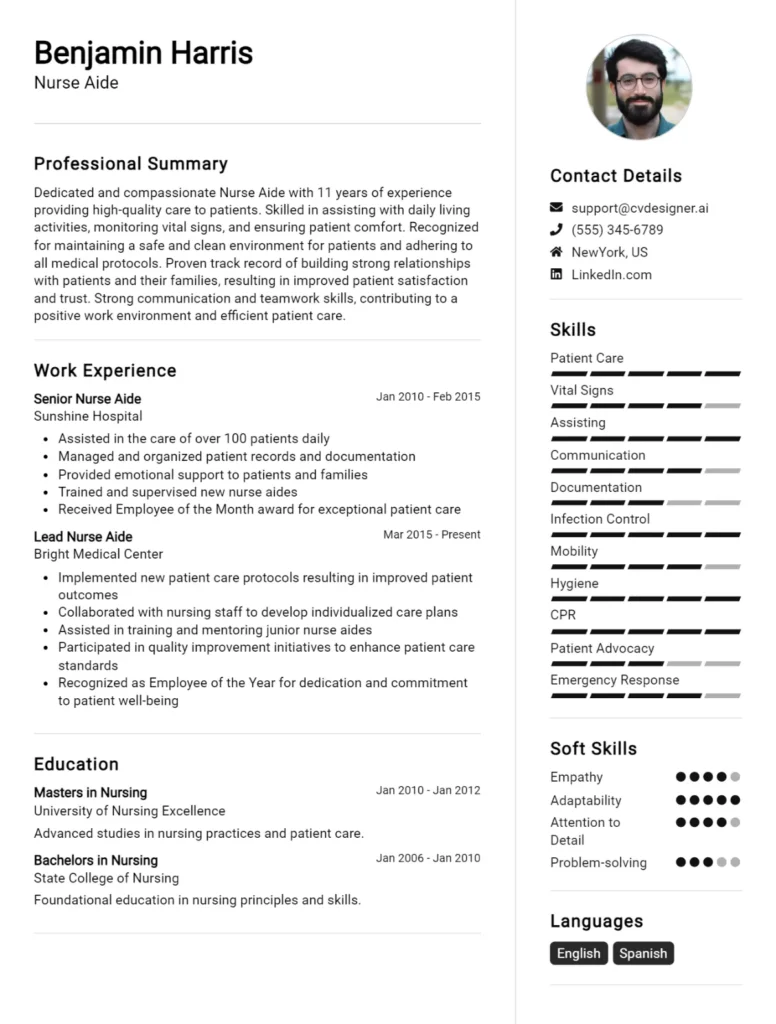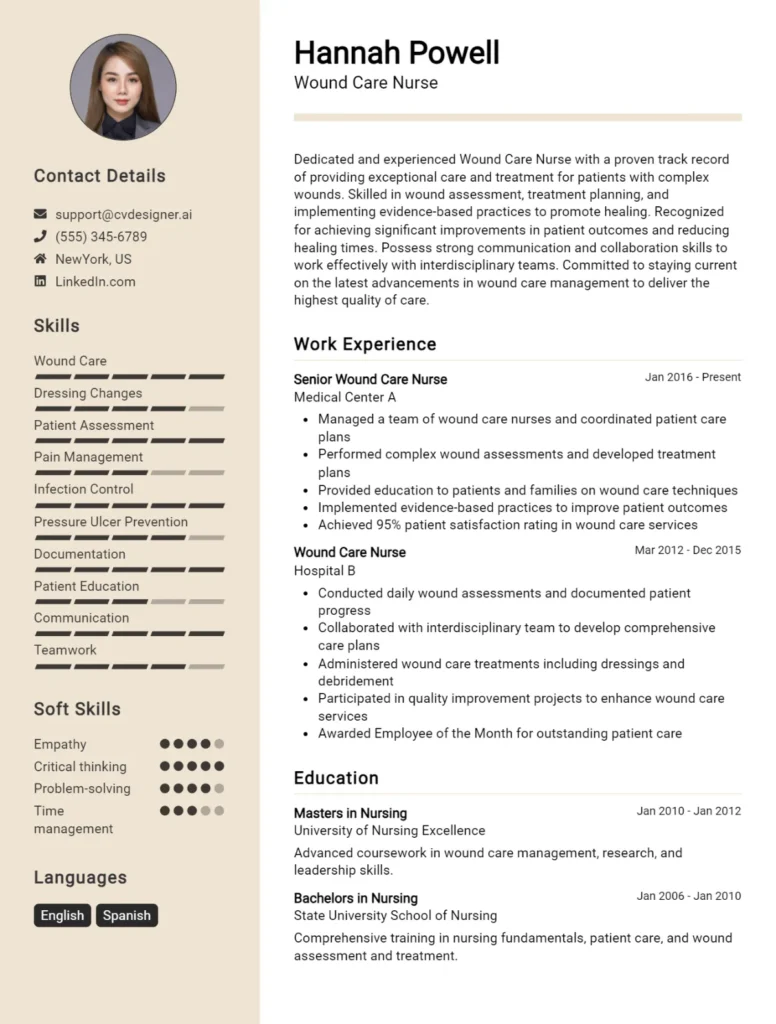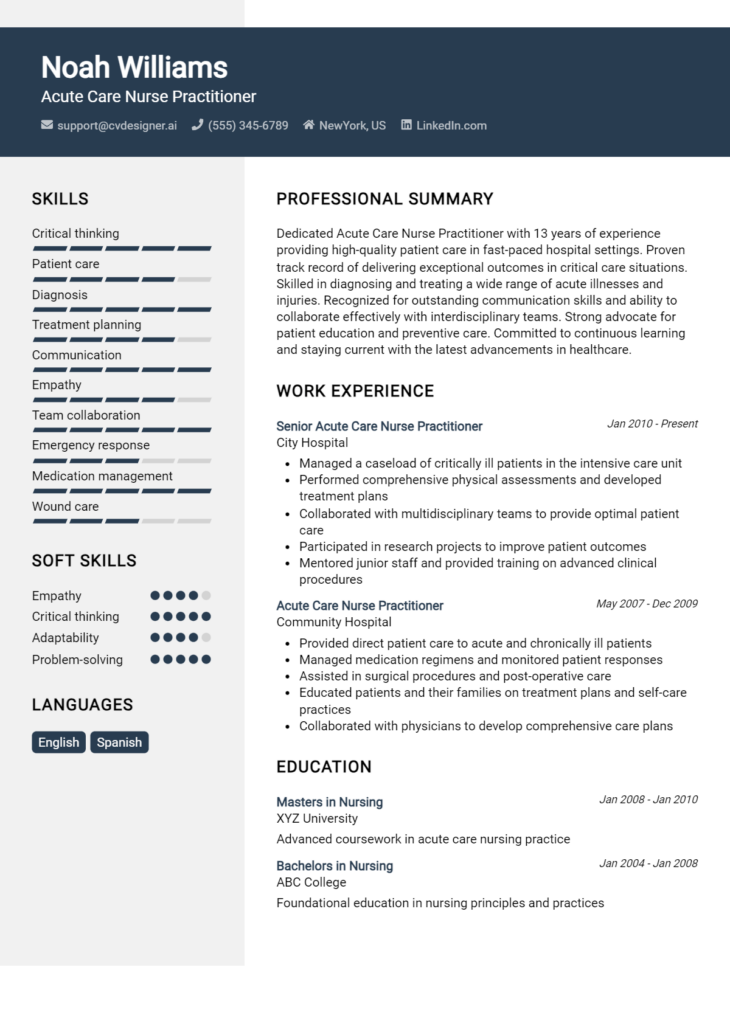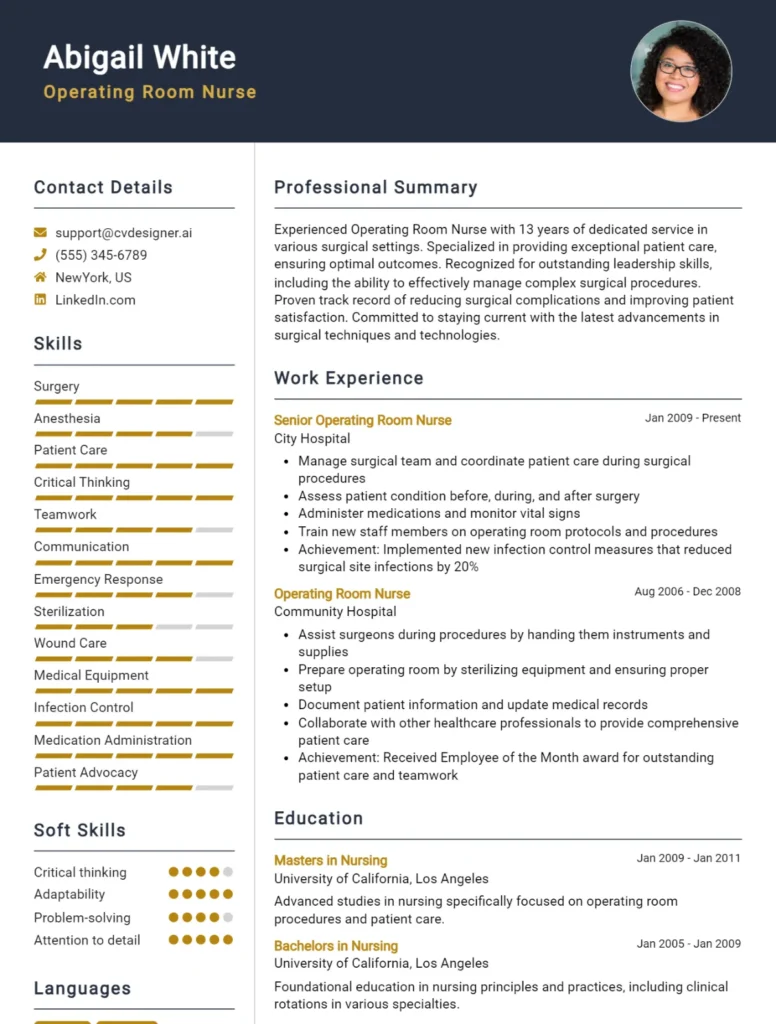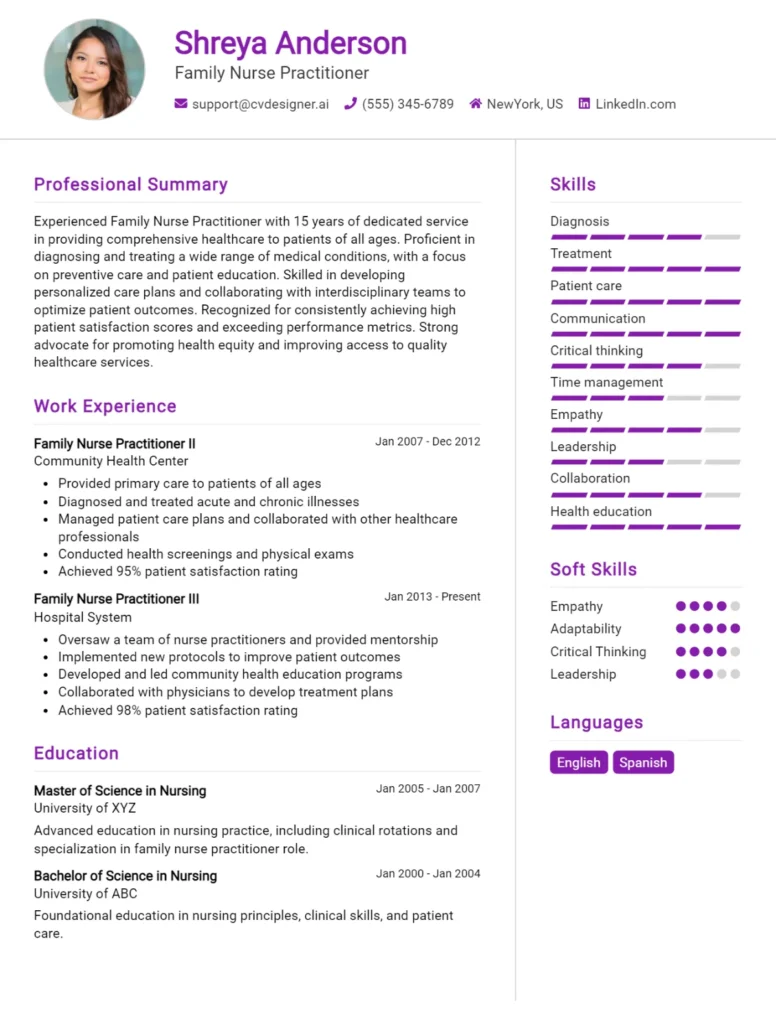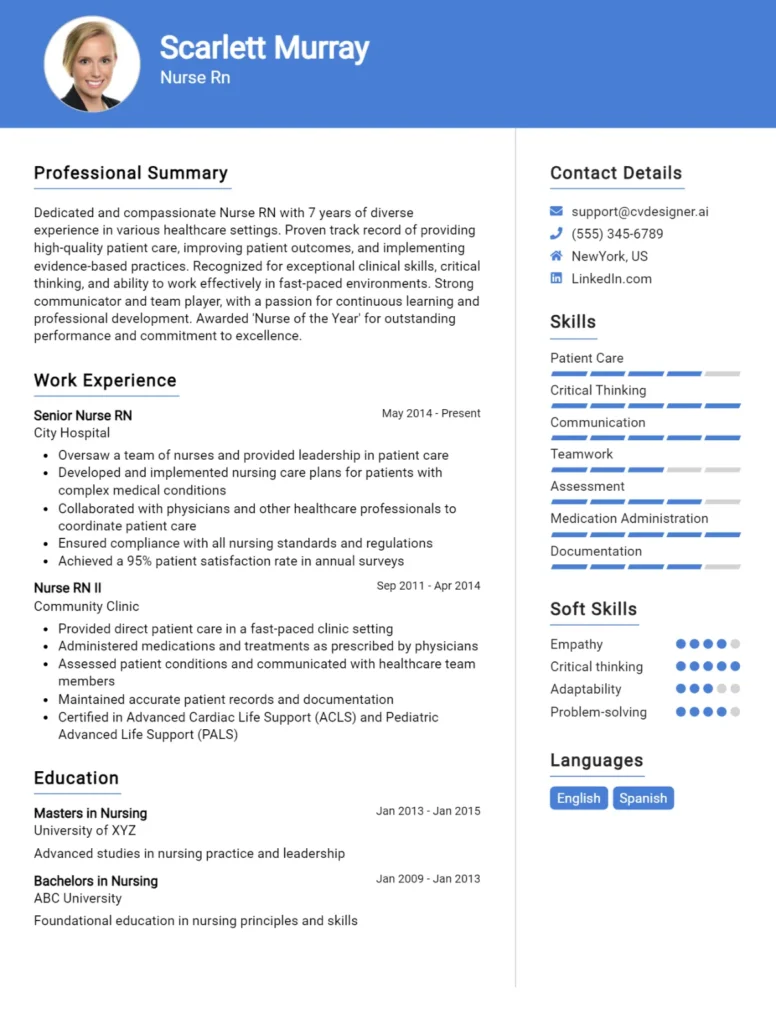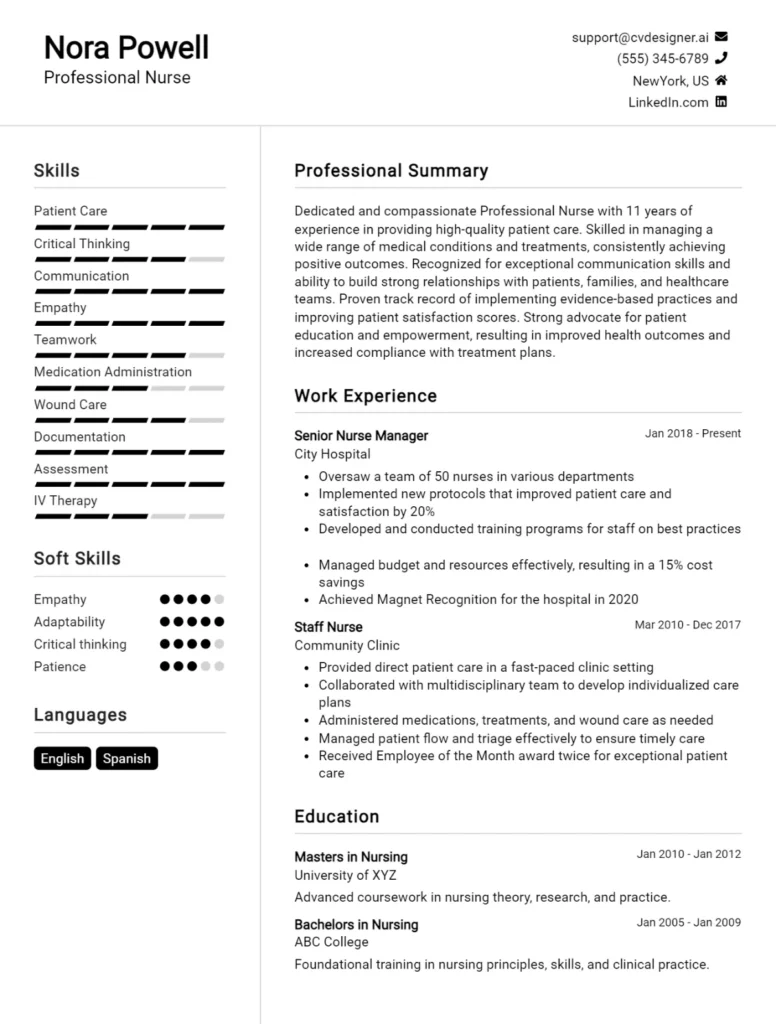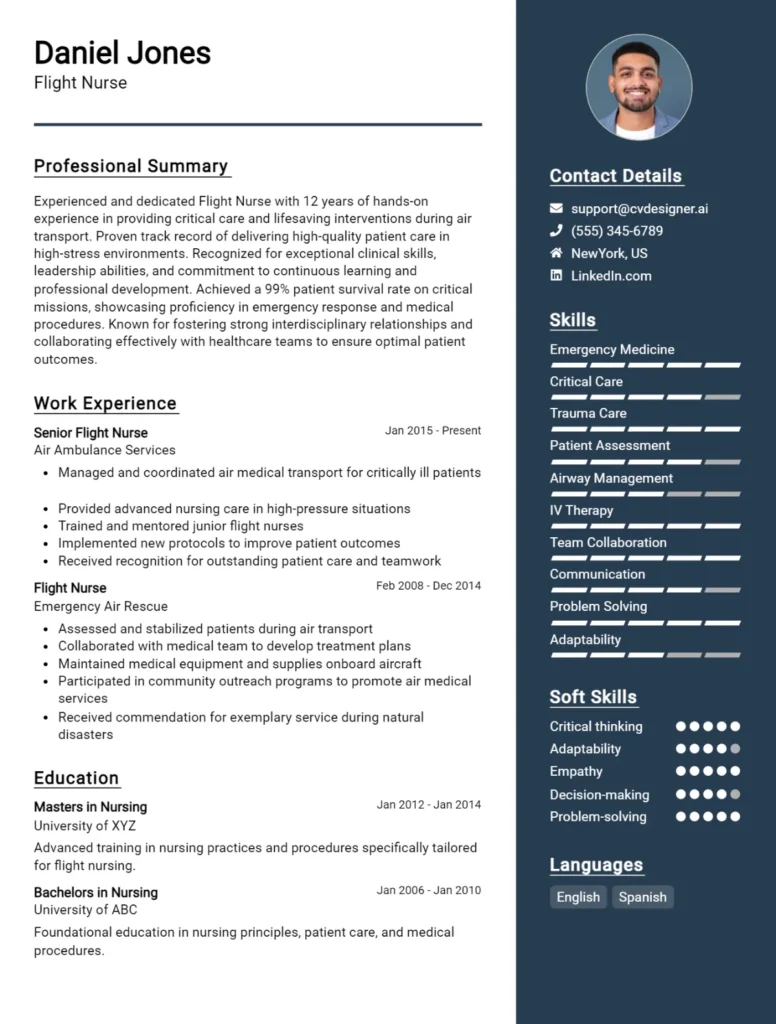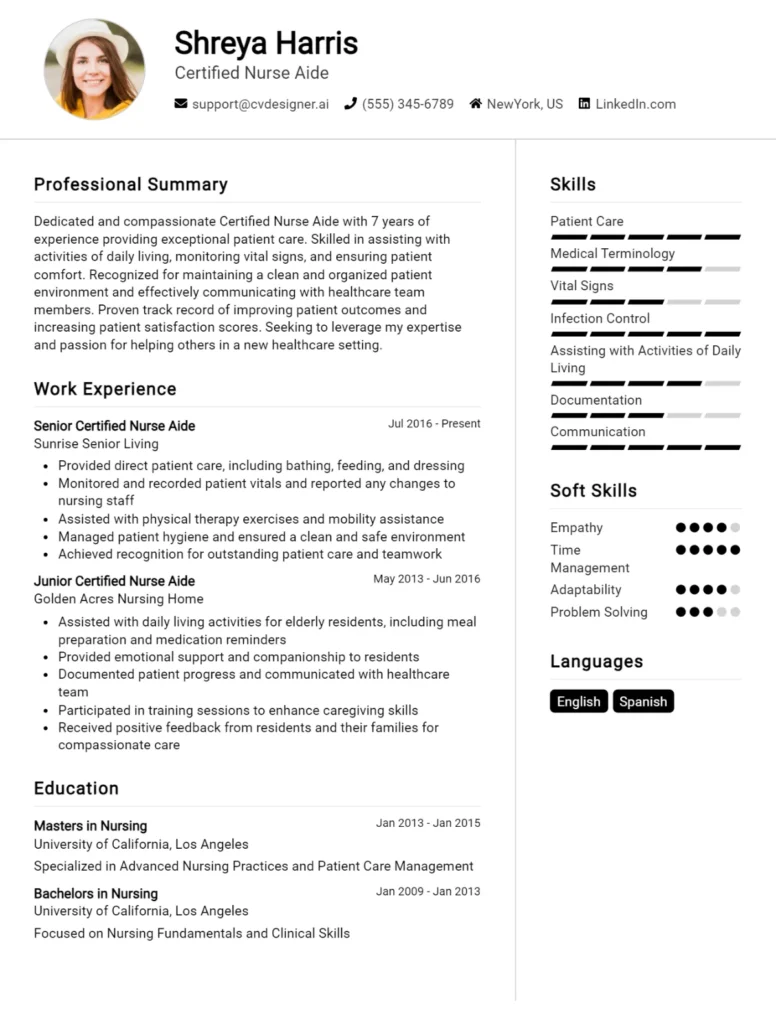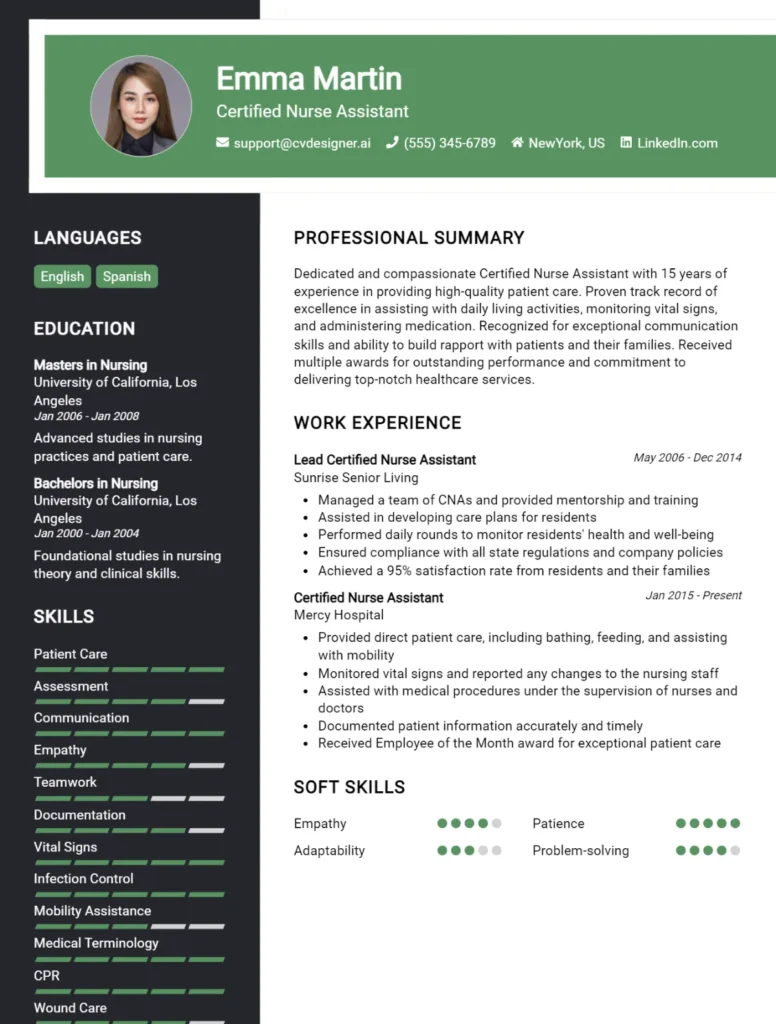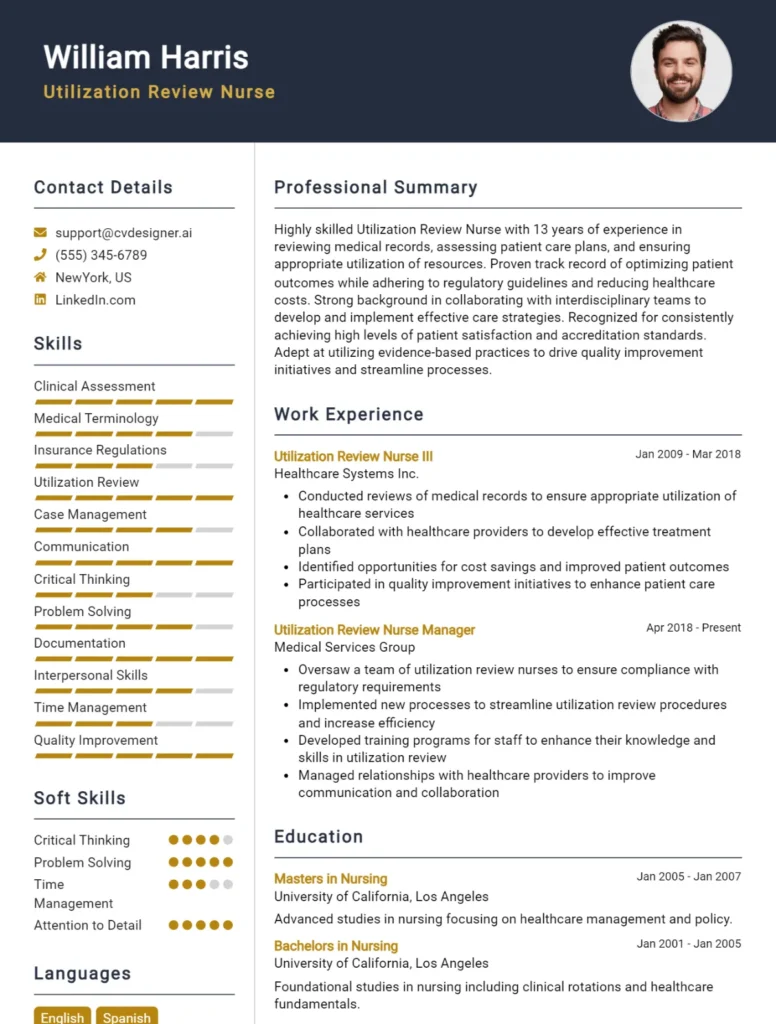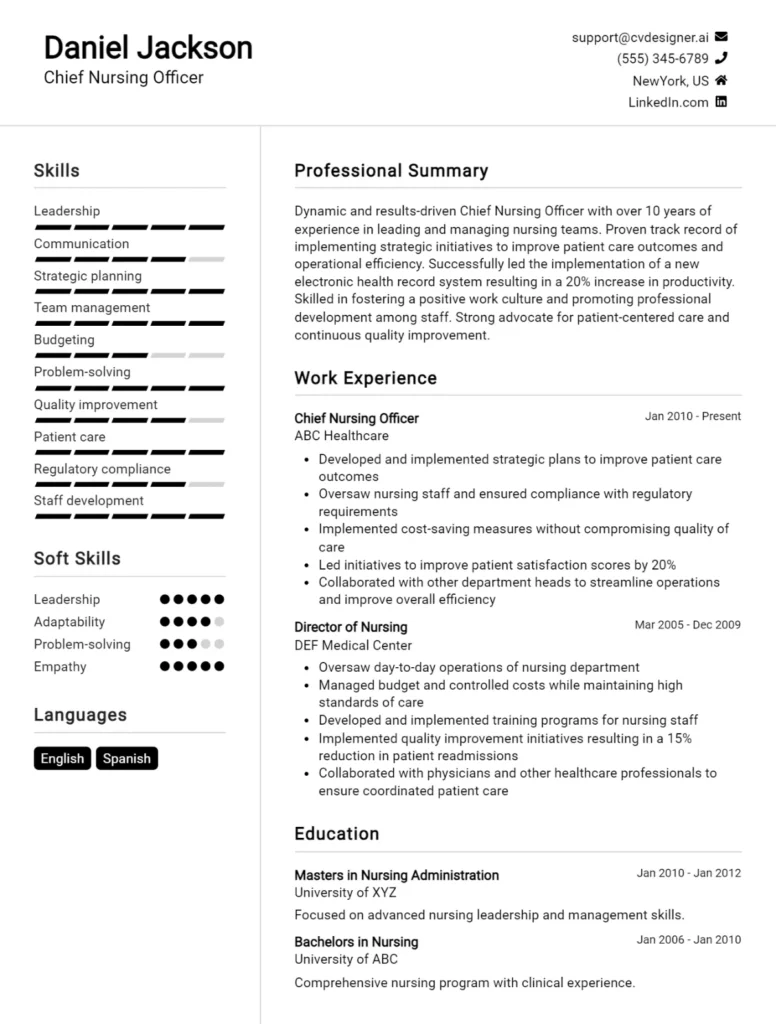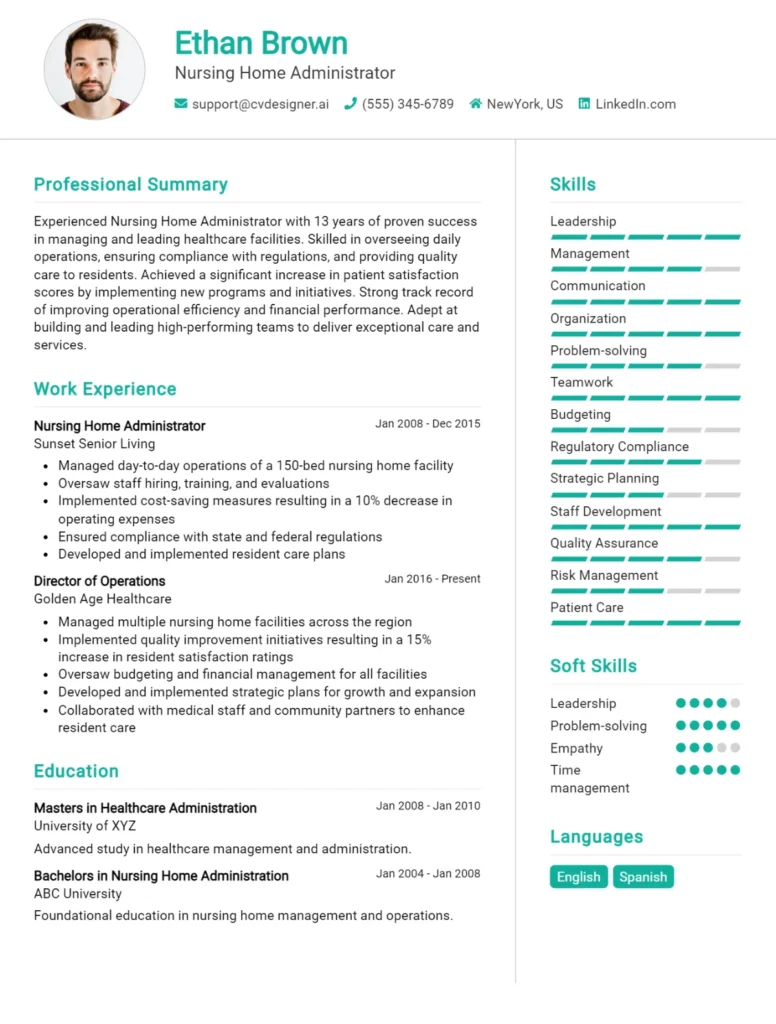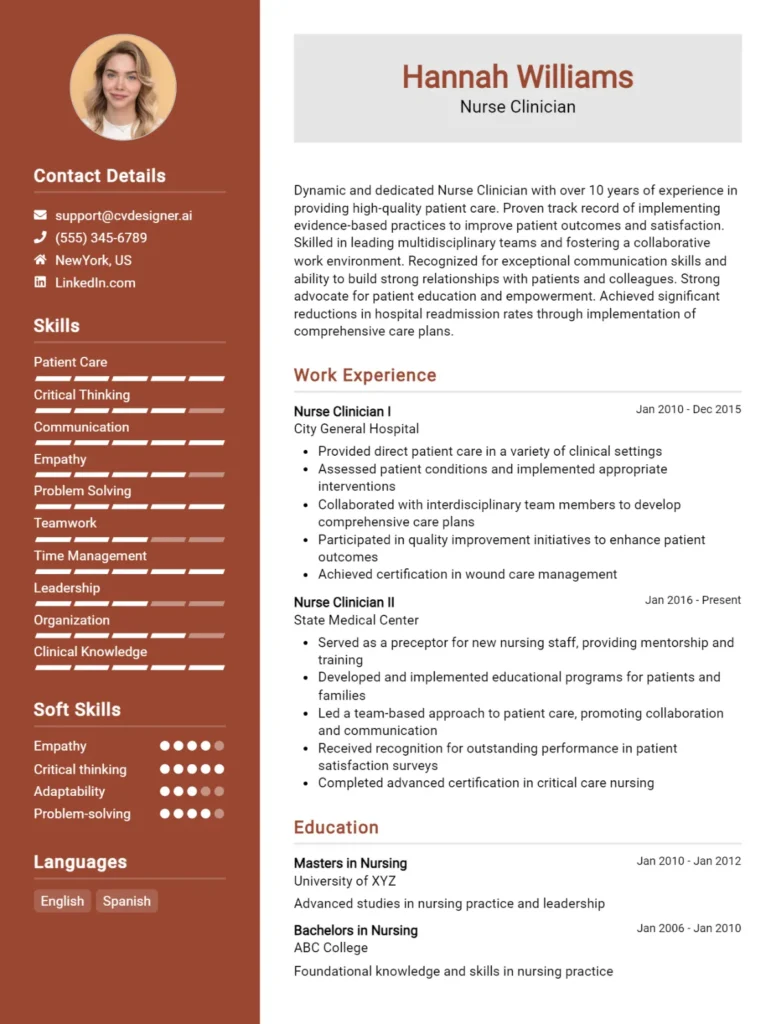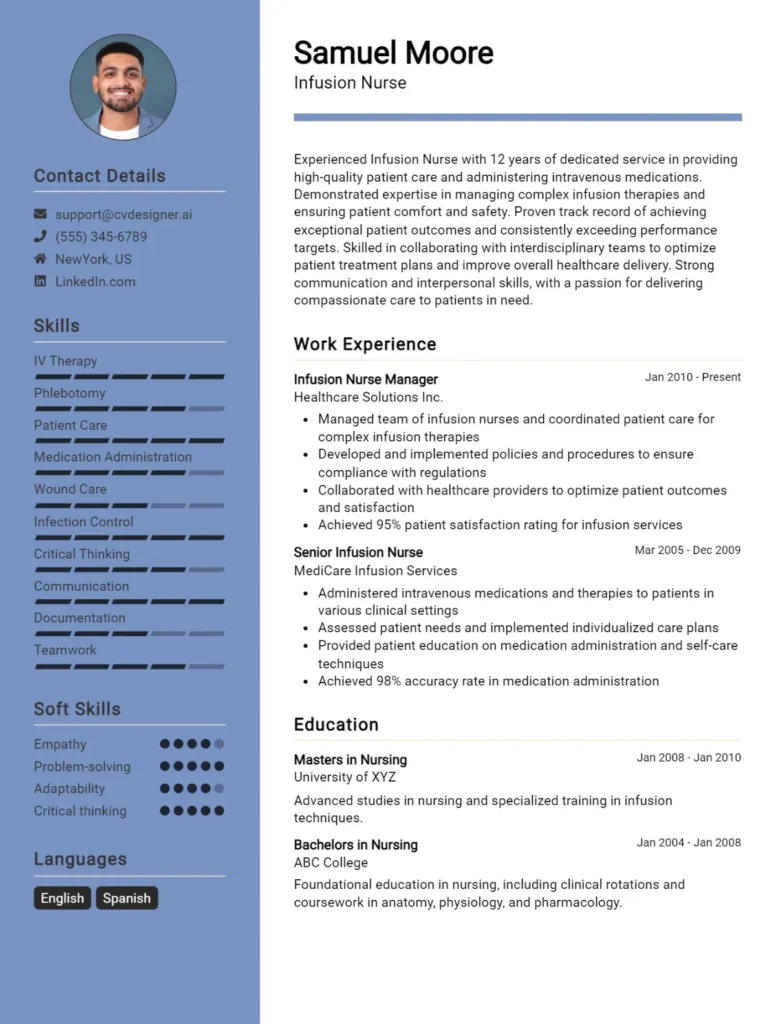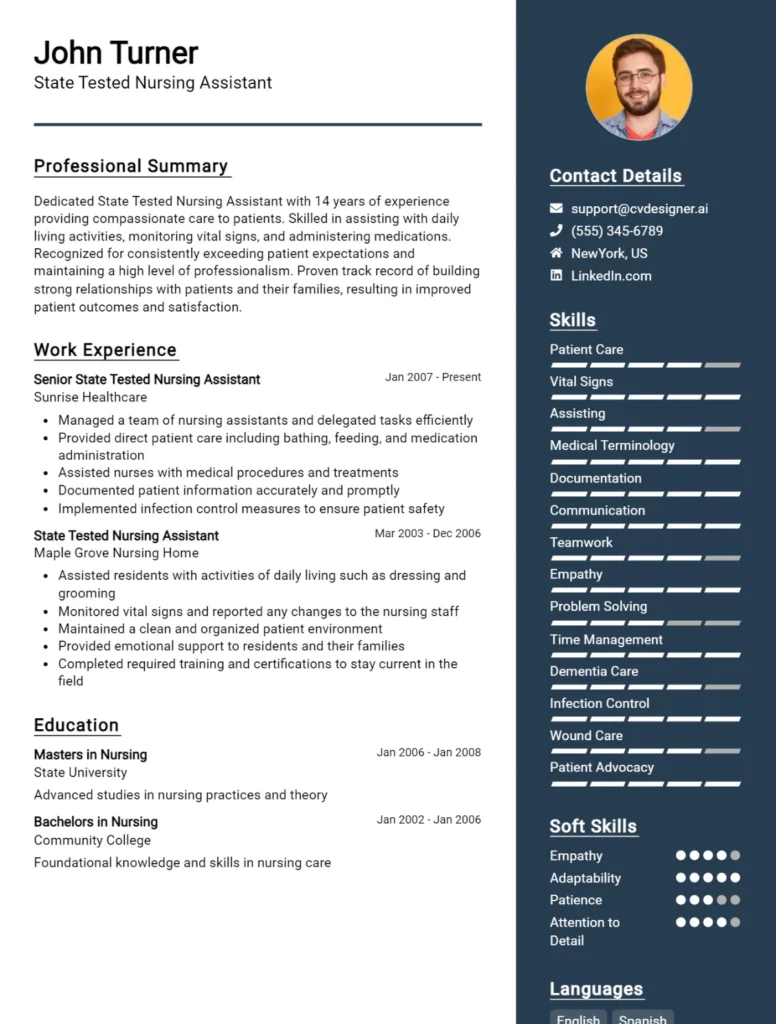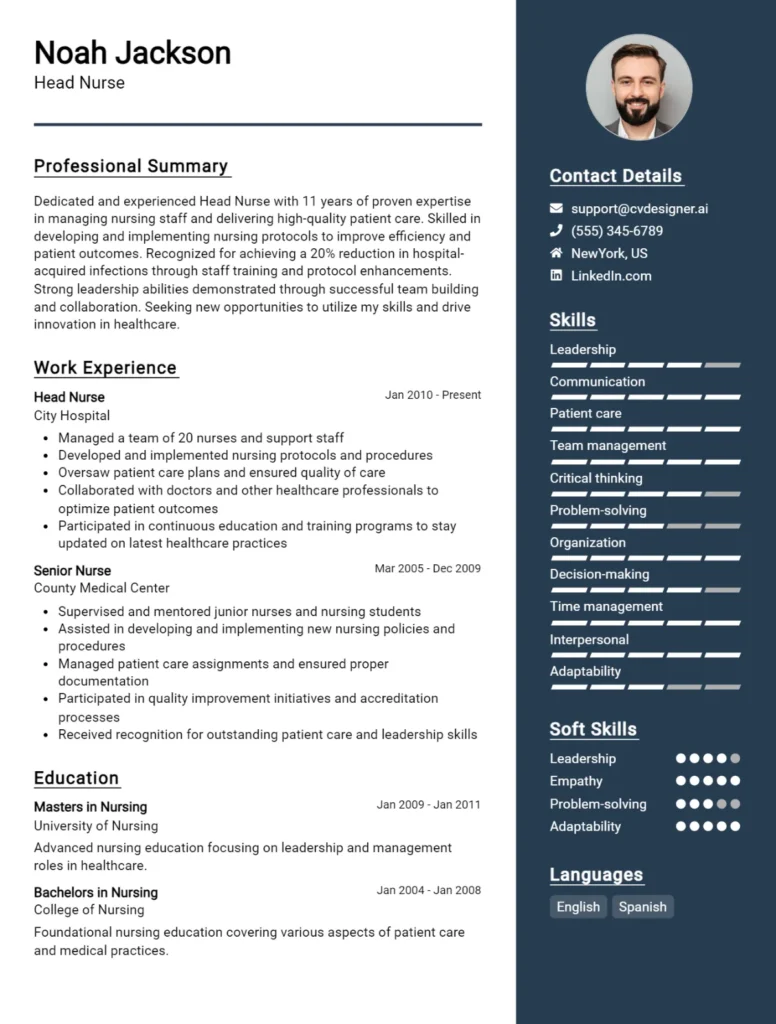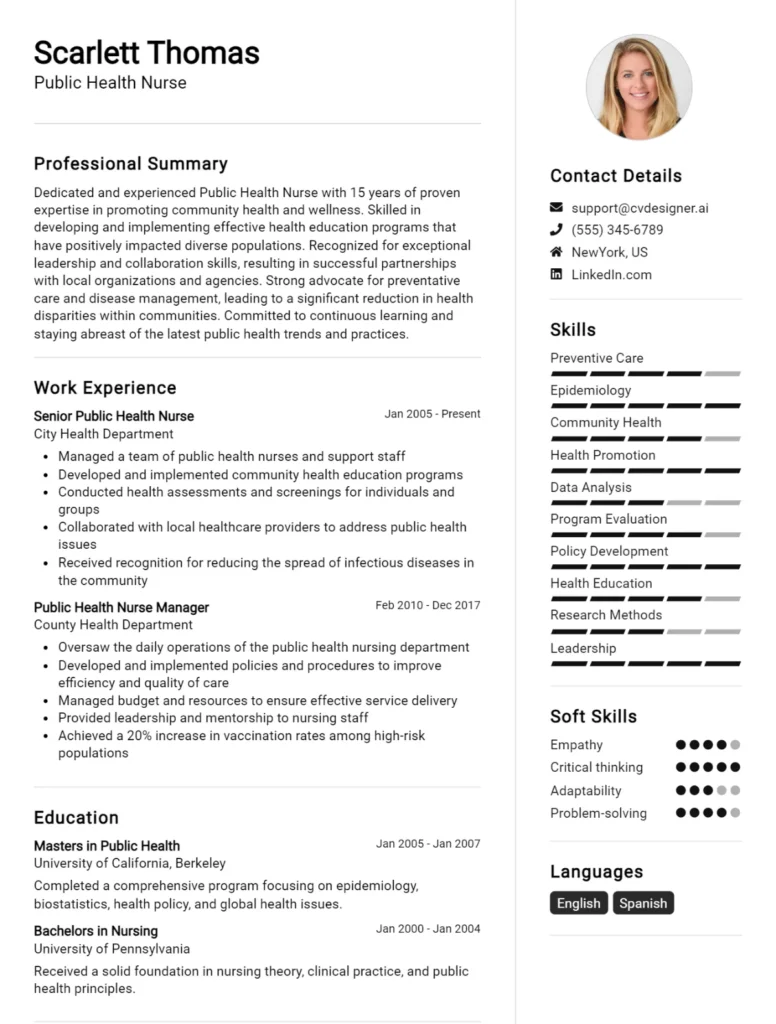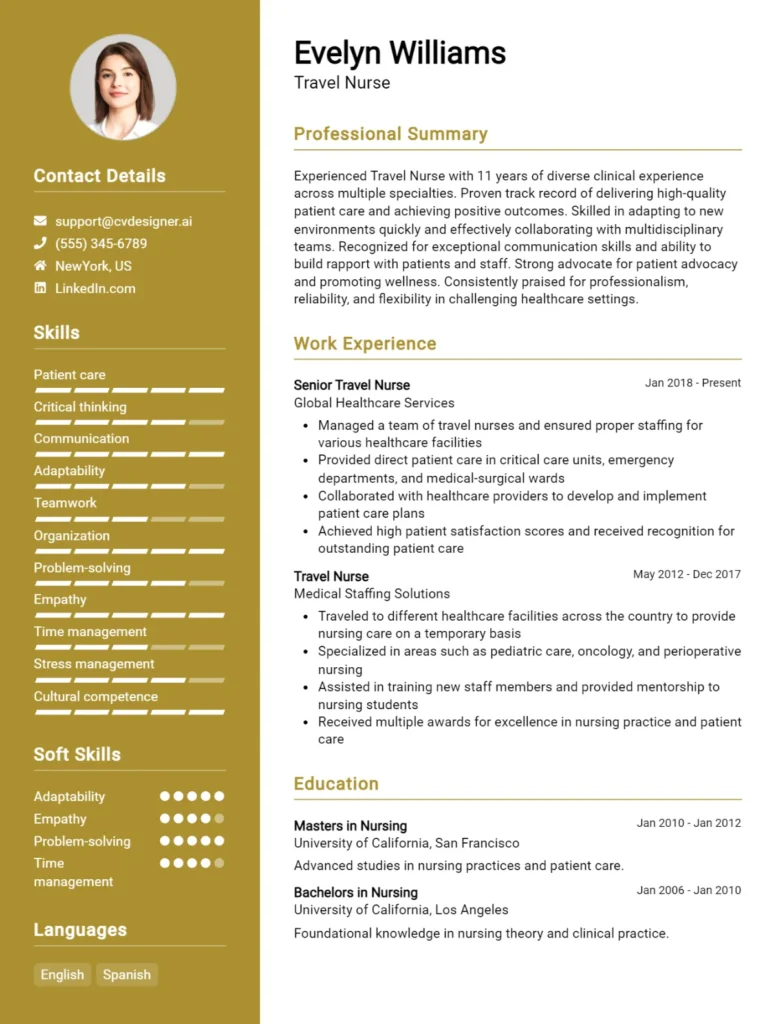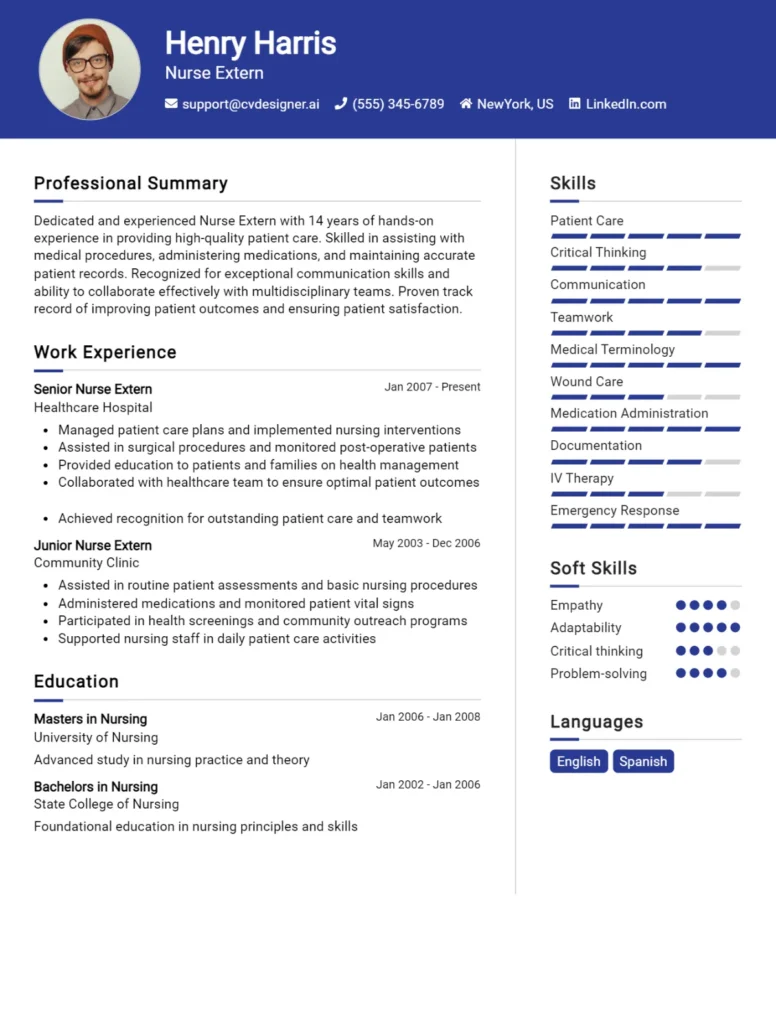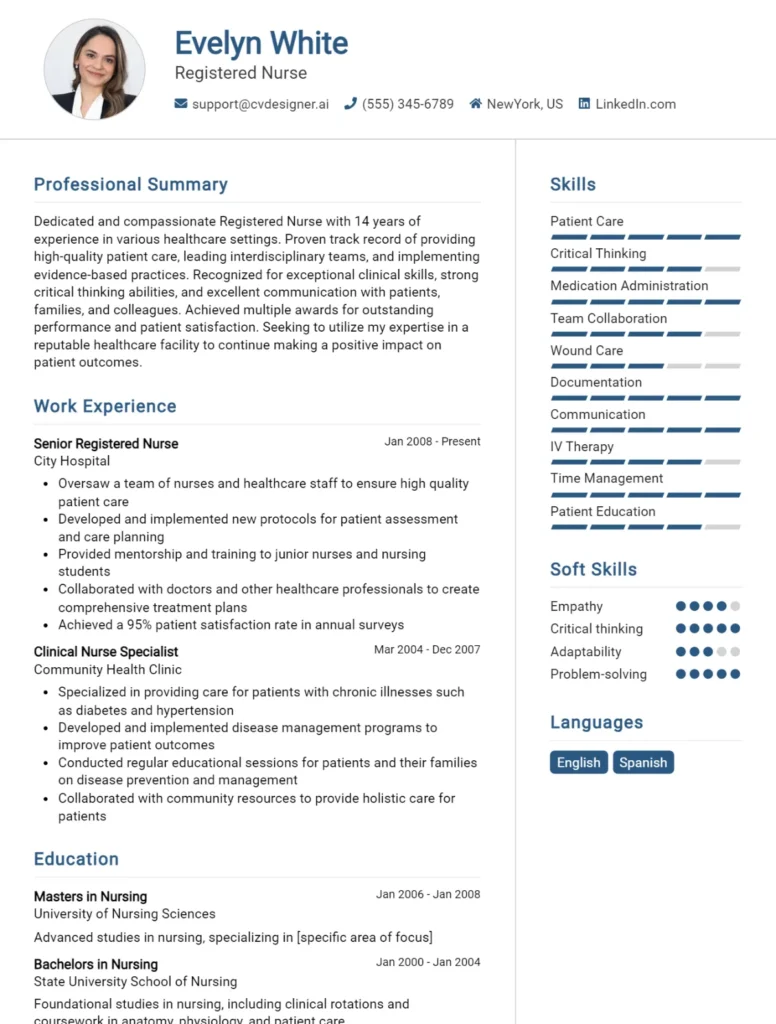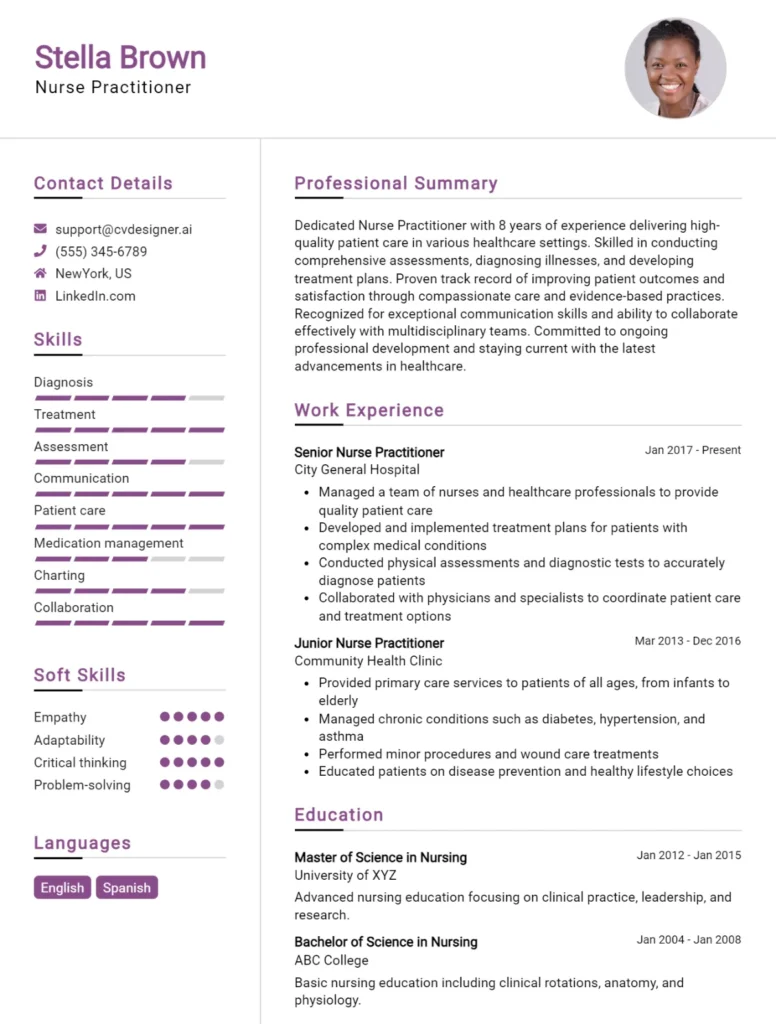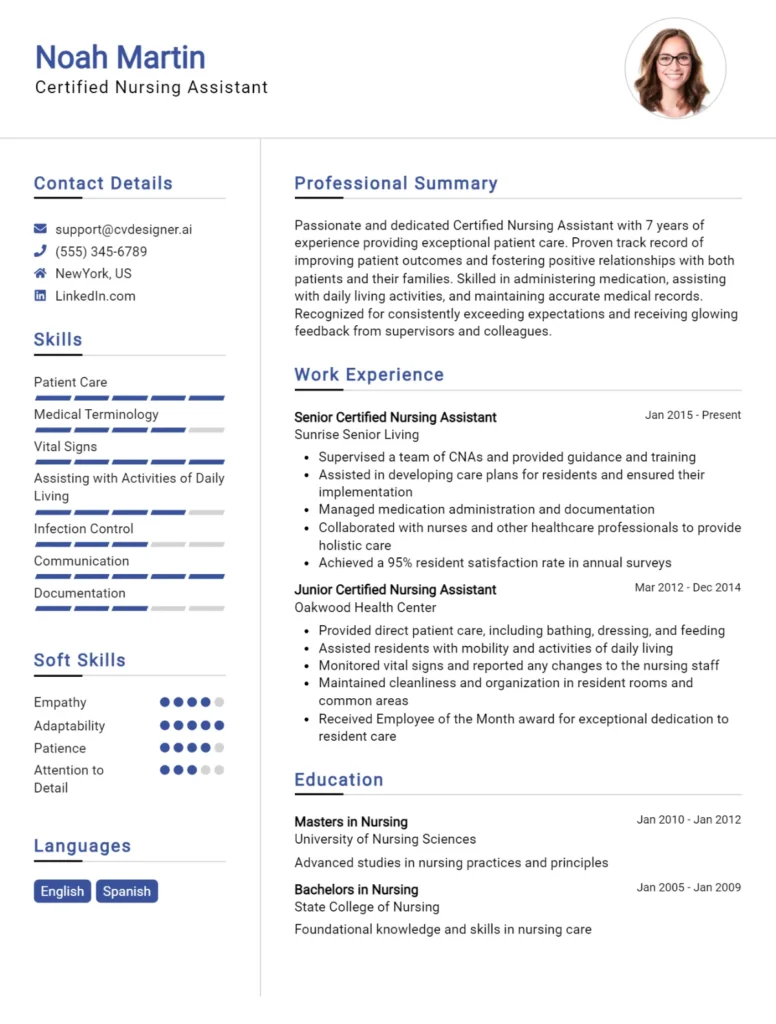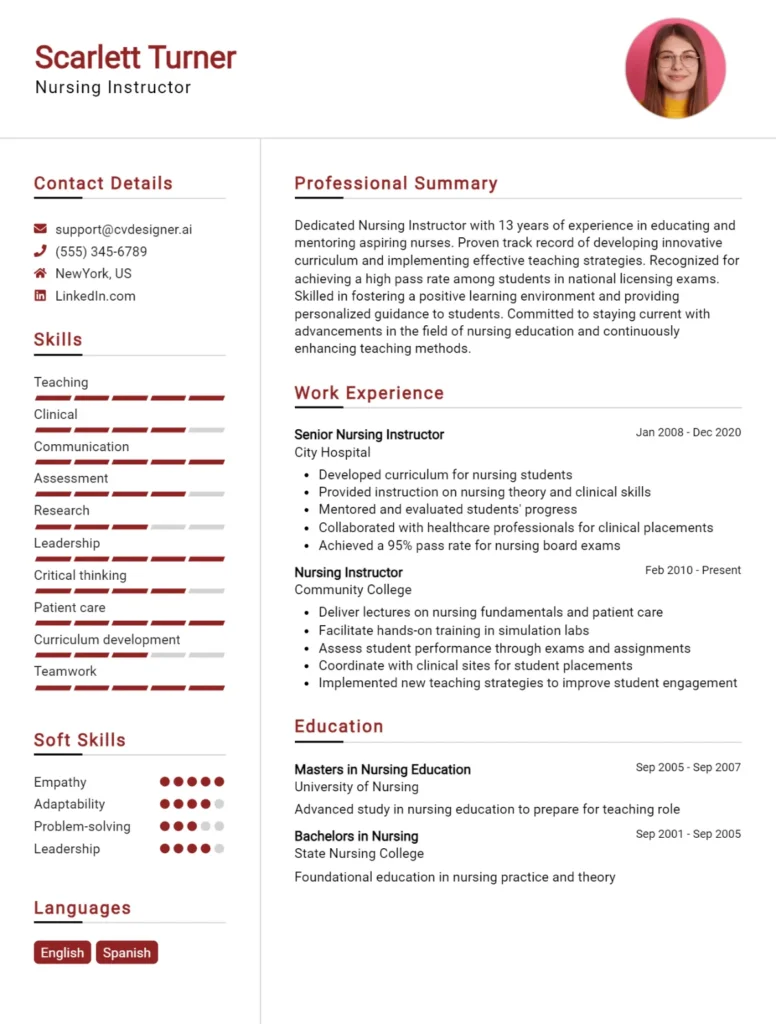Most Popular Nursing CV Examples
Explore additional Nursing CV samples and guides and see what works for your level of experience or role.
Crafting a compelling CV is a crucial step for any nursing professional seeking to make a lasting impression in the competitive healthcare job market. Whether you are a seasoned nurse or just starting your career, understanding how to effectively present your qualifications, experiences, and unique skills can set you apart from the competition. In this comprehensive Nursing CV writing guide, we will delve into essential tips and strategies to enhance your CV, ensuring it reflects your dedication and expertise. By the end of this article, you'll have the tools to create a standout CV that showcases your strengths and aligns with your career goals. Here’s what you can expect to learn:
- Key components of a successful nursing CV
- How to tailor your CV for specific nursing roles
- Effective ways to highlight your clinical skills and experiences
- Tips for presenting your education and certifications
- Insights on structuring your CV for clarity and impact
- Examples of strong CV statements that capture attention
Prepare to take your nursing career to the next level with a CV that truly represents your professional journey!
What is a Nursing CV?
A Nursing CV is a crucial document that outlines a nurse's education, qualifications, clinical experience, and skills. It serves as a professional summary that showcases the nurse's expertise and suitability for a specific role in the healthcare field. A well-crafted CV not only highlights the nurse's competencies but also demonstrates a commitment to patient care and professional development. For those looking to create an impactful CV, following a comprehensive cv writing guide can provide valuable insights into structure and content.
The importance of a Nursing CV cannot be overstated, as it is often the first impression a potential employer will have of a candidate. In a competitive job market, a detailed and well-organized CV can set a nurse apart from others. Utilizing a cv maker can streamline the process of creating a polished and professional document, ensuring that all relevant information is presented clearly. Ultimately, a strong Nursing CV is an essential tool for securing job opportunities, advancing one’s career, and promoting a nurse's professional identity.
Key Components of a Nursing CV
- Contact Information: Include your full name, phone number, email address, and LinkedIn profile if applicable.
- Professional Summary: A brief statement summarizing your nursing qualifications, experience, and career goals.
- Licenses and Certifications: List all relevant nursing licenses and certifications, including the state of issuance and expiration dates.
- Education: Detail your nursing degree(s), including the name of the institution, location, and graduation date.
- Clinical Skills: Highlight specific nursing skills such as patient assessment, wound care, and medication administration. For a comprehensive list of essential skills, refer to the link.
- Work Experience: Provide a detailed history of your nursing roles, including job titles, employers, dates of employment, and key responsibilities. More on how to effectively present your work experience can be found in the linked article.
- Professional Affiliations: Mention any nursing organizations or associations you are a member of.
- Continuing Education: List any additional training or courses relevant to nursing that you've completed.
- Awards and Honors: Include any recognitions or awards received for your work in the nursing field.
- Volunteer Experience: Highlight any volunteer work, especially in healthcare settings, to showcase your commitment to community service.
- References: State that references are available upon request or include a few professional references with their contact information.
- Personal Statement: Optionally, include a personal statement that reflects your passion for nursing and patient care.
Sample Nursing CV for Inspiration
[Your Name]
[Your Address]
[City, State, Zip Code]
[Your Phone Number]
[Your Email Address]
[LinkedIn Profile URL]
Professional Summary
Compassionate and dedicated Registered Nurse with over 5 years of experience providing high-quality care in various clinical settings. Proven ability to manage patient care effectively while collaborating with healthcare teams. Strong skills in patient assessment, treatment planning, and health education. Committed to delivering outstanding patient outcomes and improving overall healthcare experiences.
Work Experience
Registered Nurse
[Hospital Name], [City, State]
[Month, Year] – Present
- Deliver comprehensive nursing care to a diverse patient population in a fast-paced medical-surgical unit.
- Collaborate with interdisciplinary teams to develop and implement individualized care plans, resulting in a 20% increase in patient satisfaction scores.
- Administer medications and monitor vital signs, assessing patient responses and adjusting care as necessary.
- Educate patients and families on discharge instructions and health management, improving adherence to treatment plans.
Staff Nurse
[Clinic Name], [City, State]
[Month, Year] – [Month, Year]
- Provided outpatient care, including wound care, immunizations, and chronic disease management for patients of all ages.
- Conducted patient assessments and documented findings in Electronic Health Records (EHR) to ensure accurate and timely information sharing.
- Assisted in the training and orientation of new nursing staff, fostering a supportive and collaborative work environment.
Nursing Intern
[Healthcare Facility Name], [City, State]
[Month, Year] – [Month, Year]
- Gained hands-on experience in various departments, including pediatrics, geriatrics, and emergency care.
- Supported nursing staff in daily activities, including patient monitoring, medication administration, and care coordination.
- Participated in patient education initiatives, enhancing knowledge about disease prevention and health maintenance.
Education
Bachelor of Science in Nursing (BSN)
[University Name], [City, State]
[Month, Year]
Associate Degree in Nursing (ADN)
[Community College Name], [City, State]
[Month, Year]
Skills
- Patient Care & Assessment
- Medication Administration
- Care Plan Development
- Health Education & Promotion
- Electronic Health Records (EHR)
- Team Collaboration
- CPR & First Aid Certified
- Strong Communication Skills
Publications
- [Author(s)], “Title of the Article,” [Journal Name], [Volume], [Issue], [Year].
- [Author(s)], “Title of the Study,” [Conference Name], [Date of Presentation].
Certifications
- Registered Nurse (RN), [State Licensing Board], [Year]
- Basic Life Support (BLS), American Heart Association, [Year]
- Advanced Cardiovascular Life Support (ACLS), American Heart Association, [Year]
- Pediatric Advanced Life Support (PALS), American Heart Association, [Year]
Professional Affiliations
- Member, American Nurses Association (ANA)
- Member, [State Nursing Association]
Nursing CV Writing Tips
When crafting a CV for a nursing position, it's essential to highlight your clinical skills, relevant qualifications, and experience in a clear and structured manner. Start with a strong personal statement that reflects your passion for nursing and your career objectives. Tailor your CV to the specific role you're applying for, emphasizing your most relevant experiences and achievements. Use bullet points for easy readability and ensure that your CV is well-organized, with sections clearly delineated. Remember to proofread for errors, as attention to detail is crucial in the nursing profession.
CV Writing Tips for Nursing:
- Personalize Your CV: Tailor your CV for each job application by aligning your skills and experiences with the job description.
- Highlight Clinical Skills: Clearly list your clinical competencies, including any specialized training or certifications relevant to the role.
- Include Relevant Experience: Focus on your nursing experience, detailing your roles in previous positions and any notable achievements.
- Showcase Education and Certifications: List your nursing qualifications, including your degree, nursing licenses, and any additional certifications (e.g., BLS, ACLS).
- Use Action Verbs: Begin bullet points with strong action verbs (e.g., "administered," "coordinated," "managed") to convey your contributions effectively.
- Keep It Concise: Aim for a CV length of 1-2 pages, ensuring that every piece of information is relevant and adds value.
- Professional Formatting: Use a clean and professional layout, with consistent fonts and spacing to enhance readability.
- Proofread: Carefully check for grammatical errors and typos, as these can undermine your attention to detail in the nursing field.
Nursing CV Summary Examples
A well-crafted CV summary is essential for nursing professionals as it serves as a brief overview of your qualifications, experience, and passion for patient care. Here are several effective examples of CV summaries tailored for nursing roles:
“Compassionate and dedicated Registered Nurse with over 5 years of experience providing high-quality patient care in fast-paced hospital environments. Proficient in developing and implementing patient care plans, collaborating with interdisciplinary teams, and educating patients and families about health management.”
“Dynamic and results-oriented Licensed Practical Nurse with a strong background in geriatrics and acute care. Committed to delivering exceptional patient-centered care while maintaining a focus on safety and comfort. Proven ability to build rapport with patients and families, enhancing overall satisfaction and care outcomes.”
“Detail-oriented Nurse Practitioner with extensive experience in primary care and chronic disease management. Skilled in conducting thorough assessments, performing diagnostic tests, and developing tailored treatment plans. Passionate about health education and empowering patients to take an active role in their health.”
“Enthusiastic nursing professional with a solid foundation in pediatric care and a genuine passion for supporting children and families through challenging health issues. Strong communicator with exceptional organizational skills, dedicated to improving patient outcomes through attentive and personalized care.”
“Experienced Clinical Nurse Specialist with a focus on critical care and patient safety. Known for implementing evidence-based practices and driving quality improvement initiatives within multidisciplinary teams. Adept at mentoring and training nursing staff to enhance overall clinical performance and patient care standards.”
Build a Strong Experience Section for Your Nursing CV
When crafting the experience section of your nursing CV, it's essential to highlight your clinical skills, patient interactions, and contributions to healthcare teams. This section should clearly demonstrate your ability to provide exceptional patient care, adapt to diverse medical environments, and collaborate with other healthcare professionals. Below are several examples that showcase how to effectively describe your nursing experience.
- Registered Nurse, General Medical-Surgical Unit, City Hospital, Anytown, USA
Provided high-quality care to a diverse patient population, managing an average of 5-7 patients per shift. Conducted comprehensive assessments, developed individualized care plans, and collaborated with multidisciplinary teams to optimize patient outcomes. - Pediatric Nurse, Children's Health Center, Anytown, USA
Delivered compassionate nursing care to pediatric patients and their families in a fast-paced environment. Administered medications, monitored vital signs, and educated families on disease management and health promotion strategies. - Charge Nurse, Intensive Care Unit, Regional Medical Center, Anytown, USA
Led a team of nurses in delivering critical care to patients with life-threatening conditions. Oversaw patient care coordination, facilitated family meetings, and mentored junior nurses, enhancing team performance and patient satisfaction. - Nurse Practitioner, Family Medicine Clinic, Anytown, USA
Provided primary and preventive care to patients of all ages, performing physical exams, diagnosing illnesses, and developing treatment plans. Collaborated with physicians to manage chronic conditions and improve patient education initiatives. - Emergency Room Nurse, City Emergency Department, Anytown, USA
Expertly triaged patients in a high-pressure environment, utilizing advanced assessment skills to prioritize care. Delivered life-saving interventions, maintained accurate documentation, and participated in trauma response teams to ensure efficient patient flow. - Home Health Nurse, Community Health Services, Anytown, USA
Conducted in-home assessments and provided skilled nursing care to patients recovering from surgery and managing chronic illnesses. Developed personalized care plans and collaborated with family members to promote health and independence. - Clinical Nurse Educator, Anytown Nursing School, Anytown, USA
Designed and implemented educational programs for nursing students, focusing on clinical skills and patient care best practices. Mentored students during clinical rotations, fostering a supportive learning environment that enhanced their professional development. - Nurse Manager, Long-Term Care Facility, Anytown, USA
Oversaw daily operations of a 100-bed facility, managing a team of 30 nursing staff. Streamlined processes to improve care delivery, implemented staff training programs, and ensured compliance with regulatory standards, leading to a 20% increase in resident satisfaction scores.
Nursing CV Education Examples
A well-crafted CV is essential for nursing professionals to showcase their educational qualifications effectively. Below are several examples of educational backgrounds that are relevant to a nursing career, highlighting the diversity of paths one can take in this rewarding field.
- Bachelor of Science in Nursing (BSN)
This four-year degree provides comprehensive training in nursing practice, including clinical skills, patient care, and healthcare management. Graduates are well-prepared to take the NCLEX-RN exam and pursue careers in various healthcare settings. - Associate Degree in Nursing (ADN)
Typically a two-year program, the ADN focuses on the technical aspects of nursing and prepares students for entry-level nursing positions. This degree is often offered at community colleges and emphasizes both classroom instruction and clinical experience. - Master of Science in Nursing (MSN)
An advanced degree that allows registered nurses to specialize in specific areas of nursing, such as nurse practitioner, nurse educator, or clinical nurse leader. This program often includes coursework in advanced health assessment, pharmacology, and healthcare policy. - Doctor of Nursing Practice (DNP)
The DNP is a terminal degree for nursing professionals aiming to advance their clinical expertise and leadership skills. This program typically emphasizes evidence-based practice, quality improvement, and healthcare systems management. - Certified Nurse Midwife (CNM) Program
This specialized educational program prepares registered nurses to provide care to women during pregnancy, childbirth, and postpartum. It includes both theoretical knowledge and clinical practice in midwifery.
Skills to Highlight in Your Nursing CV
As a nursing professional, showcasing the right blend of skills on your CV is essential for standing out in a competitive job market. Employers look for candidates who not only possess technical knowledge and clinical expertise but also exhibit strong interpersonal abilities that enhance patient care and collaboration within healthcare teams. Below is a comprehensive list of soft and hard skills that are vital for a successful nursing career.
Soft Skills:
- Empathy
- Effective Communication
- Teamwork and Collaboration
- Adaptability
- Time Management
- Problem-Solving
- Attention to Detail
- Emotional Resilience
- Critical Thinking
- Patient Advocacy
Hard Skills:
- Clinical Proficiency in Patient Care
- Medication Administration
- Wound Care Management
- Vital Signs Monitoring
- Knowledge of Medical Terminology
- IV Therapy
- Basic Life Support (BLS) Certification
- Electronic Health Record (EHR) Management
- Infection Control Practices
- Health Assessment Techniques
Nursing CV Format
When applying for a nursing position, presenting your qualifications effectively is crucial. A well-structured CV can make a significant difference in showcasing your skills, experience, and dedication to patient care. The best format for a nursing CV can vary based on your level of experience and the specific role you are applying for.
For entry-level nursing positions, a functional or combination format can be ideal, while experienced nurses might benefit from a chronological format that highlights their career progression. Here are some tips on the best formats for different job levels within the nursing field:
- Entry-Level Nurses: Focus on a functional format that emphasizes relevant skills and clinical placements rather than extensive work history.
- Experienced Nurses: Use a chronological format to showcase your work experience, highlighting promotions and specialized skills gained over time.
- Nurse Practitioners and Advanced Practice Nurses: A combination format can be effective, allowing you to highlight both your clinical skills and your comprehensive work history.
- Nursing Managers or Administrators: Consider a chronological format that emphasizes leadership roles and management experience, detailing your accomplishments in previous positions.
- Specialized Nurses (e.g., ICU, Pediatrics): Tailor your CV to the specific specialty, using a format that highlights relevant certifications, training, and experience in that field.
- Travel Nurses: A combination format can work best, showcasing your adaptability and varied experiences while emphasizing key skills and certifications.
For further guidance on creating a standout CV, check out this cv format resource.
Common Mistakes to Avoid in a Nursing CV
Crafting a compelling CV is crucial for nurses seeking to advance their careers or secure new positions. A well-structured and error-free CV not only showcases your qualifications and experiences but also reflects your professionalism. To help you make a positive impression on potential employers, here are some common mistakes to avoid when creating your nursing CV:
- Failing to tailor your CV to the specific job description and requirements.
- Using generic or clichéd language instead of clear and impactful action verbs.
- Including irrelevant work experience that does not pertain to the nursing role.
- Not highlighting clinical skills and certifications that are essential for the position.
- Overloading the CV with excessive personal information, such as hobbies or unrelated interests.
- Neglecting to proofread for spelling and grammatical errors.
- Using an unprofessional email address or contact information.
- Listing job responsibilities instead of focusing on accomplishments and outcomes.
- Using an outdated format or font that makes the CV difficult to read.
- Ignoring the importance of including measurable achievements, such as patient care improvements or successful project implementations.
Key Takeaways for a Nursing CV
- Start with a strong personal statement that highlights your passion for nursing and your key qualifications.
- Include your nursing license and certifications prominently to demonstrate your qualifications.
- Organize your work experience in reverse chronological order, focusing on relevant roles that showcase your nursing skills.
- Use action verbs to describe your responsibilities and achievements, such as "administered," "assessed," and "collaborated."
- Highlight specific skills that are in demand, like patient assessment, medication administration, and patient education.
- Incorporate any specialized training or experience, such as emergency care, pediatrics, or geriatric nursing, to set yourself apart.
- Mention any relevant volunteer work or internships that demonstrate your commitment to the profession.
- Include measurable achievements, such as improvements in patient care or efficiency in your previous roles.
- Tailor your CV to each job application by using keywords from the job description, ensuring your CV aligns with the employer's needs.
- Consider using professional cv templates to create a polished and visually appealing document.
- Utilize a cv builder to streamline the process and ensure all sections are covered effectively.
- Don’t forget to complement your CV with a well-crafted cover letter using cover letter templates to further enhance your application.
Build your CV in minutes
Use an AI-powered cv builder and have your cv done in 5 minutes. Just select your template and our software will guide you through the process.
